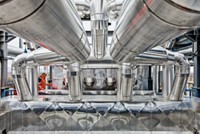Advertisement
Grab your lab coat. Let's get started
Welcome!
Welcome!
Create an account below to get 6 C&EN articles per month, receive newsletters and more - all free.
It seems this is your first time logging in online. Please enter the following information to continue.
As an ACS member you automatically get access to this site. All we need is few more details to create your reading experience.
Not you? Sign in with a different account.
Not you? Sign in with a different account.
ERROR 1
ERROR 1
ERROR 2
ERROR 2
ERROR 2
ERROR 2
ERROR 2
Password and Confirm password must match.
If you have an ACS member number, please enter it here so we can link this account to your membership. (optional)
ERROR 2
ACS values your privacy. By submitting your information, you are gaining access to C&EN and subscribing to our weekly newsletter. We use the information you provide to make your reading experience better, and we will never sell your data to third party members.
Business
Bioethanol Boost
Interest in cellulose-based ethanol is rising with the price of gasoline
by Michael McCoy
May 8, 2006
| A version of this story appeared in
Volume 84, Issue 19
As President Bush steps up the call for cellulose-based ethanol to help cure the U.S.'s "addiction to oil," fuel ethanol producers, enzymes developers, and the financial community are boosting their commitment to the technology worldwide.
Last week, the banking firm Goldman Sachs announced that it has invested $27 million in Iogen, an enzymes producer that operates the world's only cellulose ethanol facility. The plant, in Ontario, has the capacity to make 3 million to 4 million L of ethanol per year by breaking down and fermenting about 40 tons per day of wheat, oat, and barley straw with steam, enzymes, and yeast.
The announcement followed by days Bush's latest speech promoting the inclusion of $150 million in next year's federal budget for research into new ways of making ethanol.
Goldman Sachs, which joins Royal Dutch/Shell as a major investor in Iogen, says its money will be used to accelerate Iogen's commercialization program. Iogen seeks to build a plant, likely in Idaho or western Canada, that will produce around 170 million L of ethanol per year. Such a facility, however, would cost upward of $300 million, money that no financial backer has yet put up.
Brian Duff, a biochemical process engineer at biofuels consulting firm BBI International, says cellulosic ethanol is economically feasible at today's gasoline prices. Yet the risks associated with building the first plant are huge. "Nobody wants to be the guinea pig," he says. "There's a lot of 'wait and see' going on."
Meanwhile, interest is growing in Europe. Abengoa, a Spanish energy company, is building a plant designed to make more than 5 million L of cellulosic ethanol annually. Iogen, Shell, and Volkswagen are studying a facility in Germany. And the enzymes producer Genencor, which worked with the U.S. government to bring down the price of cellulase enzymes, just joined a French consortium looking to produce ethanol from pulp mill waste.



Join the conversation
Contact the reporter
Submit a Letter to the Editor for publication
Engage with us on Twitter